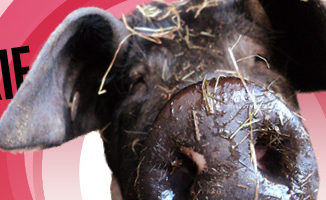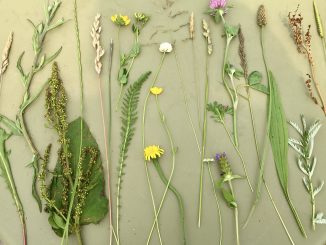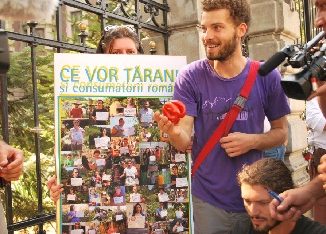 Civil Society urges EU law-makers to come up with an environment, farmer and consumer friendly review of the legislation on the marketing of Seed and Propagating Material (S&PM)
Civil Society urges EU law-makers to come up with an environment, farmer and consumer friendly review of the legislation on the marketing of Seed and Propagating Material (S&PM)
PDF French version: Il faut sans délai stopper le déclin de la biodiversité au sein des semences
PDF German version: Der Verlust der Saatgut-Vielfalt muss gestoppt werden
PDF English version: Seed diversity decline must urgently be stopped
Brussels, 24/05/2012 – Today, a broad coalition of over 240 civil society organisations and enterprises (1) from 40 countries from the EU, the EFTA, candidate countries and from 6 continents urged European leaders to reverse the disastrous decline in biodiversity in Europe. In their Open Letter to the Members of the European Parliament and 7 European Commissioners the NGOs argue that the present review of the legislation on the marketing of Seed and Propagating Material (S & PM) (2) represents a unique opportunity to make the long overdue move towards a sustainable European seed policy that contributes to the protection and improvement of biodiversity and the environment, that takes into account consumers´ interest in diversity on the food market and in availability of healthy food also in the future, and that responds to needs of small scale farmers and gardeners for locally adapted seeds.
The Food and Agriculture Organisation (FAO) estimates a loss of cultivated agricultural biodiversity of 75% since 1900, when the seed market emerged. EU seed legislation, established in the 1960s, contributed to this erosion process by banning all seeds from the market that are not compatible with a list of criteria, many of these criteria being shaped for seed production for large scale and industrial needs. In the meantime, during the last 30 years, the seed sector has gone through massive concentration processes, leading to nowadays not more than 10 multinational companies controlling 74% of the global seed market.
“In addition to making the Common Agriculture Policy (CAP) more environmentally friendly, maintaining seeds diversity is essential to ensuring that agriculture systems are resilient to the threats they face” said Faustine Defossez, agriculture and bioenergy policy officer for the EEB. “European agriculture faces enormous challenges including soil depletion, loss of biodiversity, water quality and without serious investments these will not be resolved. A sound review of the legislation on Seed and Propagating Material is one essential tool to get there” she added.
Agricultural Biodiversity has been rightly identified as “the very stuff of food production and an essential resource for plant and animal breeding” by the IAASTD (2009) (3). For Antje Kölling from the IFOAM EU Group, the use of varieties bred under organic farming conditions as well as other locally adapted varieties with a wider genetic basis is essential to conserve and improve the capacity of food production systems to adapt successfully to changing environmental conditions, and thus to ensure future food security. Moreover, the availability of a broad range of varieties bears the potential to support the delivery of ecosystem services from farm land and to reduce the amount of inputs such as water, chemicals and pesticides. “To respond to the pressing challenges our food systems are facing, the EU seed legislation urgently needs a ‘Greening’ – which means we need to create spaces that facilitate the use and marketing of plant varieties with a broader intra-varietal genetic spectrum” she added.
Seed savers groups throughout Europe are concerned by the EU seed legislation. “European private gardens play an important role in providing fresh and healthy food to the citizens. But they are also an important refuge for an almost extinct diversity of vegetables and fruits”, says Christian Schrefel, president of Arche Noah, seed savers association in Central Europe. “The private freedom of exchanging seeds must not be sacrificed in the name of productivity and uniformity. Illegalizing these activities would lead to accelerated extinction of European seed diversity and drive us further towards seed industry dominance.”
“Seeds are much more than an economic commodity. They have an ethical value linking culture and food habits.” Piero Sardo, President of the Slow Food Foundation for Biodiversity, is concerned that the disappearance of local seeds has gone hand in hand with the disappearance of small farmers, local food cultures and traditional knowledge. “Increasing seed diversity also means stimulating healthy food diversity and the richness of taste,” Sardo says.
Guy Kastler from the European Coordination Via Campesina, organisation fighting for farmer’s rights, points out the essential contributions that farmers in Europe have made throughout centuries, make and will continue to make to the conservation and development of agricultural biodiversity: “The review of the S&PM legislation must recognize the rights of farmers in Europe to save, reuse, share, sell and protect their seeds.”
It is now time for policy makers to act and implement citizens and farmers needs for an overdue review that allows use of sustainable seeds and diversity in tastes and colours.
Notes to Editors:
(1) List of signatures available at www.SeedForAll.org
(2) http://ec.europa.eu/food/plant/propagation/evaluation/docs/15042011_options_analysis_paper_en.pdf
(3) International assessment of agricultural knowledge, science and technology for development (IAASTD): global report / edited by Beverly D. McIntyre . . . [et al.].




